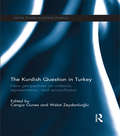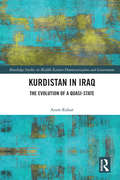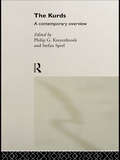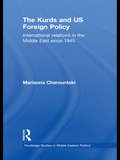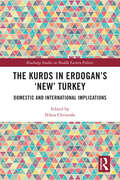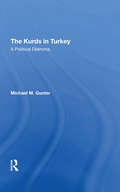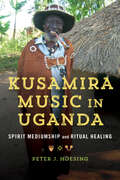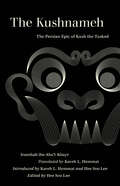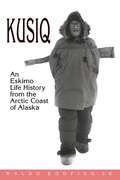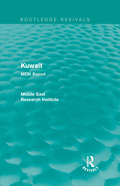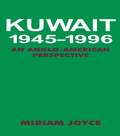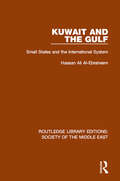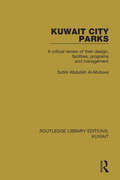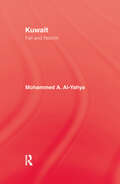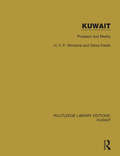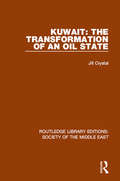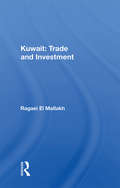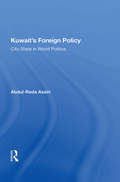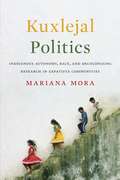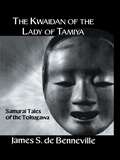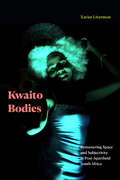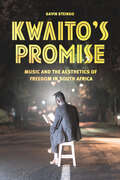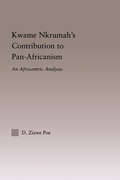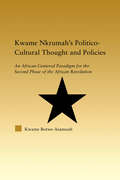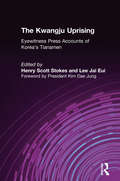- Table View
- List View
The Kurdish Question in Turkey: New Perspectives on Violence, Representation and Reconciliation (Exeter Studies in Ethno Politics)
by Cengiz Gunes Welat ZeydanlioğluAlmost three decades have passed since political violence erupted in Turkey’s south-eastern regions, where the majority of Turkey’s approximately 20 million Kurds live. In 1984, the Kurdistan Workers’ Party (PKK) initiated an insurgency which intensified in the following decades and continues to this day. Kurdish regions in Turkey were under military rule for more than a decade and the conflict has cost the lives of 45,000 people, including soldiers, guerrillas and civilians. The complex issue of the Kurdish Question in Turkey is subject to comprehensive examination in this book. This interdisciplinary edited volume brings together chapters by social theorists, political scientists, social anthropologists, sociologists, legal theorists and ethnomusicologists to provide new perspectives on this internationally significant issue. It elaborates on the complexity of the Kurdish question and examines the subject matter from a number of innovative angles. Considering historical, theoretical and political aspects of the Kurdish question in depth and raising issues that have not been discussed sufficiently in existing literature, this book is an invaluable resource for students and scholars of Nationalism and Conflict, Turkish Politics and Middle Eastern politics more broadly.
Kurdistan in Iraq: The Evolution of a Quasi-State (Routledge Studies in Middle Eastern Democratization and Government)
by Aram RafaatThe Kurdish-Iraqi conflict lies in the fact that Kurdistan is a nation-without-a-state and Iraq is a non-nation state, each possessing a nationhood project differing from and opposing the other. Iraqi-Kurdistan is an outward looking entity seeking external patronage. Though external patronage has played a pivotal role in the evolution of the Kurdish quasi-state, a lack of positive patronage has prevented it from achieving independence. This book looks at how the Kurdish and Iraqi quests for nationhood have led to the transformation of Iraqi Kurdistan into an unrecognised quasi-state, and the devolution of the Iraqi state into a recognised quasi-state. This is done by examining the protracted Iraqi-Kurdish conflict and by analysing the contradictions and incompatibilities between the two different nationalisms: Iraqi and Kurdish. The author explains that Kurds as a nation without a state have their own nationhood project which is in opposition to the Iraqi nationhood project. Each has its own identity, loyalty and sovereignty. The book answers the question as to how the Kurdish quest for nationhood has been treated by successive Iraqi regimes. Furthermore, it fills in the literary gaps which exist in relation to the Iraqi-Kurdish conflict by specifying and categorising the cardinal conditions that drive ethnic and nationalist conflicts which lead to the creation of separatist entities. Drawing upon a vast amount of untapped Kurdish and Arabic primary sources, the book draws on prominent theories on nation-states and quasi-states. It will particularly appeal to students and scholars of international relations, political theory and Middle Eastern Studies.
The Kurds: A Contemporary Overview (SOAS/Routledge Studies on the Middle East)
by Philip G. Kreyenbroek Stefan SperlThe position of the 19 million Kurds is an extremely complex one. Their territory is divided between 5 sovereign states, none of which have a Kurdish majority. They speak widely divergent dialects, and are also divided by religious affiliations and social factors. It has taken the tragic and horrifying events in Iraq this year to bring the Kurds to the centre of the world stage, but their particular problems, and their considerable geo-political importance, have been the source of growing concern and interest during the last two to three decades. There is a remarkable dearth of reliable and up-to-date information about the Kurds, which this book remedies. Its contributors cover social and political issues, legal questions, religion, language, and the modern history of Kurds in Turkey, Iraq, Iran, Syria and the Soviet Union. The Kurds will be an invaluable source of reference for students and specialists in Middle East studies, and those concerned with wider questions of nationalism and cultural identity. It also offers extremely useful background information for those with a professional concern for the numerous Kurdish immigrants and asylum seekers in Western Europe and North America.
The Kurds and US Foreign Policy: International Relations in the Middle East since 1945 (Routledge Studies in Middle Eastern Politics)
by Marianna CharountakiThis book provides a detailed survey and analysis of US–Kurdish relations and their interaction with domestic, regional and global politics. Using the Kurdish issue to explore the nature of the engagement between international powers and weaker non-state entities, the author analyses the existence of an interactive US relationship with the Kurds of Iraq. Drawing on governmental archives and interviews with political figures both in Northern Iraq and the United States, the author places the case study within a broader International Relations context. The conceptual framework centres on the inter-relations between actors (both state and non-state) and structures of material and ideational kinds, while the detailed survey and analysis of US–Kurdish relations, in their interaction with domestic, regional and global politics, forms the empirical core of the study. Stressing the intertwining of domestic and foreign policy as part of the same set of dynamics, the case study explains the emergence of the interactive and institutionalized US relationship with the Kurds of Iraq that has brought about the formation, within an Iraqi framework, of an undeclared US official Kurdish policy in the post-Saddam era. Filling a gap in the literature on US–Kurdish relations as well as the broader topic of International Relations, this book will be of great interest to those in the areas of International Relations, Middle Eastern and Kurdish Politics.
The Kurds in Erdogan's "New" Turkey: Domestic and International Implications (Routledge Studies in Middle Eastern Politics)
by Nikos ChristofisThis book focuses on the AKP government since 2002 during which time the state’s approach to the Kurdish Question has undergone several changes. Examining what preceded and followed the failed putsch of 2016, it explains and critiques that situates the Kurdish Question in its broader context. It stands out with the main objective to avoid any ‘policy-oriented bias’ through an interdisciplinary and multi-thematic approach. The volume discusses the state and policies in the Kurdish region of Turkey, as well as counter-hegemonic discourses that seek to reform existing institutions. Some chapters focus on the domestic aspects and gender perspectives of the Kurdish Question in Turkey, which focus has been taken over by recent developments in Syria and the Middle East in general. Other chapters include a range of new aspects of Turkish society and politics, and the international aspects of Ankara’s policies and its implications not only inside Turkey but also internationally. Taking both domestic and foreign policy aspects into account, the book offers a set of innovative explanations for the state of crisis in Turkey and a solid basis for thinking about the likely path forward. Scholars, researchers and post-graduates, interested in political theory, Kurdish and Middle East politics will find this book invaluable.
The Kurds In Turkey: A Political Dilemma
by Michael GunterThis book analyzes the Kurdish problem in Turkey from the point of view of the Turkish authorities, as well as from the perspective of disaffected Kurds living in that state and abroad. It also analyzes the political instability and terrorism rampant in Turkey during the late 1970s.
Kusamira Music in Uganda: Spirit Mediumship and Ritual Healing
by Peter J. HoesingA performance culture of illness and wellness In southern Uganda, ritual healing traditions called kusamira and nswezi rely on music to treat sickness and maintain well-being. Peter J. Hoesing blends ethnomusicological fieldwork with analysis to examine how kusamira and nswezi performance socializes dynamic processes of illness, wellness, and health. People participate in these traditions for reasons that range from preserving ideas to generating strategies that allow them to navigate changing circumstances. Indeed, the performance of kusamira and nswezi reproduces ideas that remain relevant for succeeding generations. Hoesing shows the potential of this social reproduction of well-being to shape development in a region where over 80 percent of the population relies on traditional healers for primary health care. Comprehensive and vivid with eyewitness detail, Kusamira Music in Uganda offers insight into important healing traditions and the overlaps between expressive culture and healing practices, the human and other-than-human, and Uganda's past and future.
The Kushnameh: The Persian Epic of Kush the Tusked
by IranshahThe first English translation of a strange and unusual Persian epic, this action-packed tale of an evil, monstrous king explores questions of nature and nurture and brings the global middle ages to life. The great Persian epic known as the Kushnameh follows the entangled lives of Kush the Tusked––a monstrous antihero with tusks and ears like an elephant, descended from the evil emperor Zahhak––and Abtin, the exiled grandson of the last true Persian emperor. Abandoned at birth in the forests of China and raised by Abtin, Kush grows into a powerful and devious warrior. Kush and his foes scheme and wage war across a global stage reaching from Spain and Africa to China and Korea. Between epic battles and magnificent feasts are disturbing, sometimes realistic portrayals of abuse and oppression and philosophical speculation about nature and nurture and the origins of civilization. A fantastical adventure story stretching across the known world and a literary classic of unparalleled richness, this important work of medieval Persian literature is a valuable source for understanding the history of racism and constructions of race and the flows of lore and legend from the Central Asian Silk Road and the Sahara to the sea routes of the Indian Ocean and the Mediterranean. The Kushnameh is a treasure trove of Islamic and pre-Islamic Persian cultural history and a striking contemporary document of the "global middle ages," now available to English-speaking readers for the first time.
Kusiq: An Eskimo Life History From The Arctic Coast Of Alaska
by Waldo BodfishIf you are a casual reader who wants an intriguing glimpse into Eskimo life, a novice oral historian who wants to know how it is done right, or a student of Alaska who wants an Inupiat perspective of the changes that swept the western Arctic this century, read Kusiq. <P><P>(Journal of the West) <P><P> A vivid 'inside' account of an observant Eskimo male who mastered much of the traditional subsistence technology and lore and who lived through the end of commercial whaling, the development and decline of introduced reindeer herding and the fur market, and through World War II and its aftermath. In its scope as well as in the presentation of historical, cultural, and linguistic context, Kusiq is far more extensive than [other] autobiographies. <P><P>(American Indian Culture and Research Journal) <P><P> Kusiq represents a new wave in literature, the expressions of cultural awakenings among native American cultures, the attempt to redefine the native world in written form, to recast history, a history for too long the domain of the white system. <P><P>(ARCTIC) <P><P> It would be difficult to find a better, more interesting first-person account of Eskimo life during the first half of this century. [It is] second in an ambitious series of oral histories developed by the University of Alaska Press. <P><P>(Scan-A-Book)
Kuwait: MERI Report (Routledge Revivals: Middle East Research Institute Reports)
by Middle East Research InstituteFirst published in 1985, this study, focusing on Kuwait, looks at the underlying reasons why certain political, economic and social events have taken place in the country’s history. It provides vital analysis of the political and economic issues of the country, and those that have affected it, as well as providing statistical material on all the key data of the political economy.The book was originally published as part of the Middle East Research Institute (MERI) Reports on the Middle East which quickly established themselves as the most authoritative and up-to-date information on the state of affairs in the region.
Kuwait, 1945-1996: An Anglo-American Perspective
by Miriam JoyceBased on extensive research of British documents from the Public Records Office, and American documents from the National Archives and several Presidential Libraries, this book surveys events in Kuwait from the beginning of the twentieth century until the Second World War, and explains Britain's initial interest in the ruling al-Sabah family, before focusing on the post-1945 period.
Kuwait and the Gulf: Small States and the International System (Routledge Library Editions: Society of the Middle East #10)
by Hassan Ali Al-EbraheemA major result of the Second World War was the emergence of small states which vastly increased the membership of the international system. While a number of small states existed before the war many of these had made no effort to participate actively in the system; since then, the doctrine of equality of states has been established, in theory at least, through their admission to the UN. This book, first published in 1984, deals with the factors which have contributed to the emergence of such a large number of small states, the difficulties which they have experienced in achieving statehood, and their struggle to gain political integration. A precise analysis of the foreign policy and economic factors governing the activity of small states, particularly that of Kuwait and the other Gulf states, is presented here.
Kuwait City Parks: A Critical Review of their Design, Facilities, Programs and Management (Routledge Library Editions: Kuwait #3)
by Subhi Abdullah Al-MutawaThe purpose of this study, first published in 1985, was to investigate the management practices of the Kuwait City Park System and the relationship of these practices to user satisfaction. The decision making process affecting the parks had been fragmented between three agencies, and this created conflicts in different goals, responsibilities and objectives. The study shows how much impact the uncoordinated and fragmented decisions had on user satisfaction in the parks.
Kuwait - Fall & Rebirth: Fall And Rebirth
by Al-YahyaFirst published in 1993. Routledge is an imprint of Taylor & Francis, an informa company.
Kuwait: Prospect And Reality (Routledge Library Editions: Kuwait #4)
by H.V.F. Winstone Zahra FreethFor many the story of this small Arabian state begins and ends with the wealth that has accrued from its vast oil deposits. But the real fascination of Kuwait lies in its geological and archaeological history; in its long struggle for survival among powerful neighbours; in its ambitious plans for industrial and economic development. This book, first published in 1972, shows the effects of the new material wealth opened up by oil in relation to the country’s remote past and its Islamic background.
Kuwait: the Transformation of an Oil State (Routledge Library Editions: Society of the Middle East #11)
by Jill CrystalKuwait, unlike most of its neighbours, has a well-established national identity and a long history as a nation, dating back to the eighteenth century. In this book, first published in 1992, Dr. Jill Crystal focuses on two recurring themes in Kuwaiti history: one, the preservation of a sense of community in the face of radical economic, social and political transformations; the second, internal rivalry over the conventions governing relations among members of the community. Crystal skilfully weaves these themes into a broad profile of Kuwait, analysing the nation’s transformation from a pre-oil to an oil economy; its social structure and composition, including the country’s tribal roots and key divisions involving class, gender and immigrant labour; political tensions resulting from the nation’s sudden wealth and the accompanying changes in social structure; and its relations with other countries in the Gulf and the Middle East.
Kuwait: Trade And Investment
by Ragaei El MallakhAlthough small geographically, Kuwait casts a disproportionately large shadow in the areas of international finance, energy, and trade. It enjoys a capital-surplus economy, but is still a developing country and one of the fastest growing markets for goods and services. Kuwait's drive toward economic development and self-sustaining investment both at home and abroad arises from the knowledge that the nation's prosperity derives overwhelmingly from a single, nonrenewable asset—petroleum. Professor El Mallakh delineates Kuwait's economic activities and potential and assesses the country's impact on the global economy. Basing his work on two decades of research and writing on Kuwait and neighboring Gulf states, and on interviews with Kuwaiti officials and financial and business leaders, he presents a wealth of detailed and practical information, little of which is readily accessible elsewhere. He also analyzes the use of Kuwait's capital-surplus funds with reference to the region, to Europe, and to the United States, and looks at the country's priorities for future international investment and development projects.
Kuwait's Foreign Policy: City-state In World Politics
by Abdul-Reda AssiriThis book assesses the dynamics of Kuwaiti foreign policy since 1961 and explores the role of Kuwait as a small state in international politics. It analyzes the impact of ideology, religion, and value systems on Kuwaiti foreign policy as well as the impact of domestic forces on political actors.
Kuxlejal Politics: Indigenous Autonomy, Race, and Decolonizing Research in Zapatista Communities
by Mariana MoraOver the past two decades, Zapatista indigenous community members have asserted their autonomy and self-determination by using everyday practices as part of their struggle for lekil kuxlejal, a dignified collective life connected to a specific territory. This in-depth ethnography summarizes Mariana Mora's more than ten years of extended research and solidarity work in Chiapas, with Tseltal and Tojolabal community members helping to design and evaluate her fieldwork. The result of that collaboration—a work of activist anthropology—reveals how Zapatista kuxlejal (or life) politics unsettle key racialized effects of the Mexican neoliberal state. Through detailed narratives, thick descriptions, and testimonies, Kuxlejal Politics focuses on central spheres of Zapatista indigenous autonomy, particularly governing practices, agrarian reform, women's collective work, and the implementation of justice, as well as health and education projects. Mora situates the proposals, possibilities, and challenges associated with these decolonializing cultural politics in relation to the racialized restructuring that has characterized the Mexican state over the past twenty years. She demonstrates how, despite official multicultural policies designed to offset the historical exclusion of indigenous people, the Mexican state actually refueled racialized subordination through ostensibly color-blind policies, including neoliberal land reform and poverty alleviation programs. Mora's findings allow her to critically analyze the deeply complex and often contradictory ways in which the Zapatistas have reconceptualized the political and contested the ordering of Mexican society along lines of gender, race, ethnicity, and class.
The Kwaidan of the Lady of Tamiya
by James S. De BannevilleFirst published in 2001. Kwaidan are what Lafcadio Hearn calls 'stories and studies of strange things' - eerie tales which convey the enduring mystery of traditional Japanese culture and the world of the samurai. In this volume, de Benneville's rendition of the Yotsuya Kwaidan of Shunkintei Ryuo paints a picture of life in the capital city of Edo among the samurai of the highest class, jostling for power at the court of the Shogun. At the heart of the story is the Lady of Tamiya, a daughter of the samurai who is sold by her brutal husband into the floating world of brothels, from which she escapes only in death. Thereafter, the Lady is avenged as mis-forutune relentlessly overtakes all who betrayed her, and she is still remembered today in a Tokyo shrine popular with women who seek her protection. More than any history, kwaidan reveal the inner morality of the samurai code.
Kwaito Bodies: Remastering Space and Subjectivity in Post-Apartheid South Africa
by Xavier LivermonIn Kwaito Bodies Xavier Livermon examines the cultural politics of the youthful black body in South Africa through the performance, representation, and consumption of kwaito, a style of electronic dance music that emerged following the end of apartheid. Drawing on fieldwork in Johannesburg's nightclubs and analyses of musical performances and recordings, Livermon applies a black queer and black feminist studies framework to kwaito. He shows how kwaito culture operates as an alternative politics that challenges the dominant constructions of gender and sexuality. Artists such as Lebo Mathosa and Mandoza rescripted notions of acceptable femininity and masculinity, while groups like Boom Shaka enunciated an Afrodiasporic politics. In these ways, kwaito culture recontextualizes practices and notions of freedom within the social constraints that the legacies of colonialism, apartheid, and economic inequality place on young South Africans. At the same time, kwaito speaks to the ways in which these legacies reverberate between cosmopolitan Johannesburg and the diaspora. In foregrounding this dynamic, Livermon demonstrates that kwaito culture operates as a site for understanding the triumphs, challenges, and politics of post-apartheid South Africa.
Kwaito's Promise: Music and the Aesthetics of Freedom in South Africa
by Gavin SteingoIn mid-1990s South Africa, apartheid ended, Nelson Mandela was elected president, and the country’s urban black youth developed kwaito—a form of electronic music (redolent of North American house) that came to represent the post-struggle generation. In this book, Gavin Steingo examines kwaito as it has developed alongside the democratization of South Africa over the past two decades. Tracking the fall of South African hope into the disenchantment that often characterizes the outlook of its youth today—who face high unemployment, extreme inequality, and widespread crime—Steingo looks to kwaito as a powerful tool that paradoxically engages South Africa’s crucial social and political problems by, in fact, seeming to ignore them. Politicians and cultural critics have long criticized kwaito for failing to provide any meaningful contribution to a society that desperately needs direction. As Steingo shows, however, these criticisms are built on problematic assumptions about the political function of music. Interacting with kwaito artists and fans, he shows that youth aren’t escaping their social condition through kwaito but rather using it to expand their sensory realities and generate new possibilities. Resisting the truism that “music is always political,” Steingo elucidates a music that thrives on its radically ambiguous relationship with politics, power, and the state.
Kwame Nkrumah's Contribution to Pan-African Agency: An Afrocentric Analysis (African Studies)
by Daryl Zizwe PoeThis study analyzes contributions made by Kwame Nkrumah (1909-1972) to the development of Pan-African agency from the 1945 Pan-African Congress in Manchester to the military coup d'etat of Nkrumah's government in February 1966.
Kwame Nkrumah's Politico-Cultural Thought and Politics: An African-Centered Paradigm for the Second Phase of the African Revolution (African Studies)
by Kwame Botwe-AsamoahThis study critically synthesizes and analyses the relationship between Kwame Nkrumah's politico-cultural philosophy and policies as an African-centered paradigm for the post-independence African revolution. It also argues for the relevance of his theories and politics in today's Africa.
The Kwangju Uprising: A Miracle of Asian Democracy as Seen by the Western and the Korean Press (A\pacific Basin Institute Book Ser.)
by Lily Xiao Lee Henry Scott StokesThe Kwangju Uprising that occurred in May 1980 is burned into the minds of South Koreans in much the same way that Tiananmen is burned into the minds of contemporary Chinese. As the world watched in horror following the assassination of President Park Chung Hee, student protesters were brutally suppressed by the military and police led by strongman Chun Doo Hwan. Kim Dae Jung, the current president of South Korea, was imprisoned and sentenced to death during this period.This book recreates those earth-shaking events through eyewitness reports of leading Western correspondents on the scene as well as Korean participants and observers. Photographs, detailed street maps, and dramatic woodblock prints further illuminate the day-to-day drama to keep this atrocity alive in the conscience of the world.
